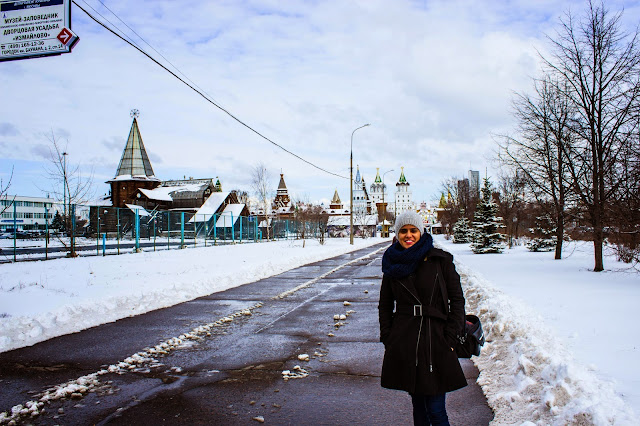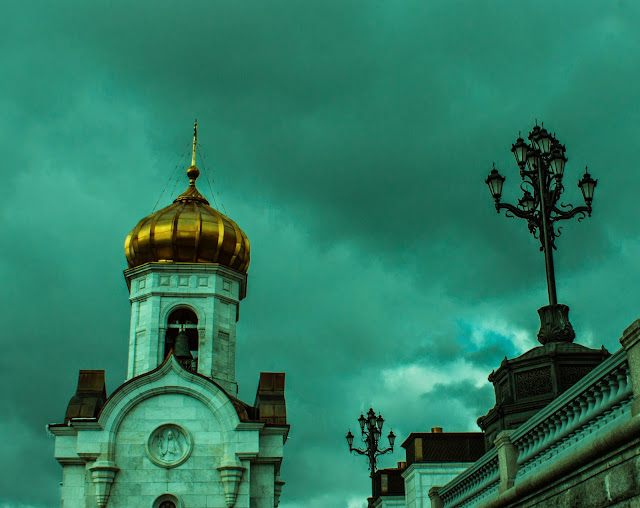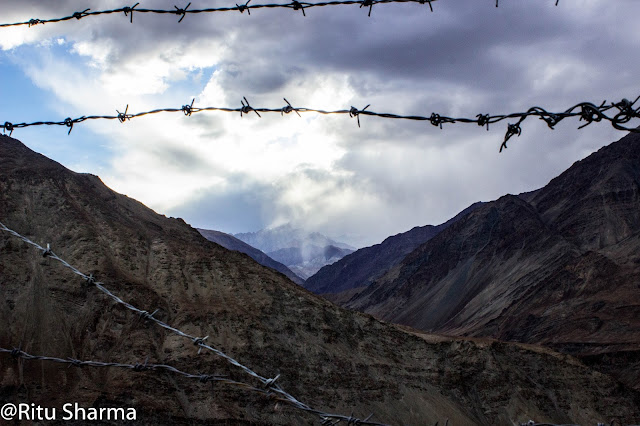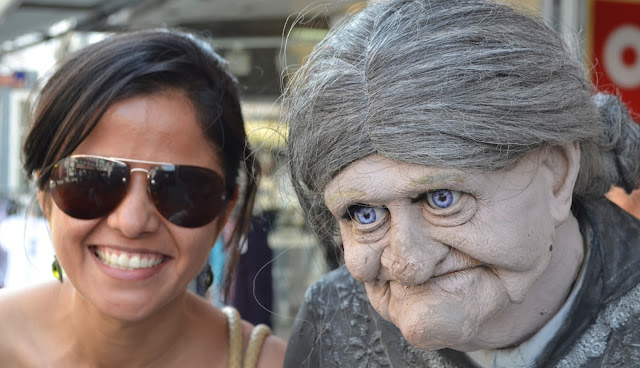From Russia With Love...
Weathering the Storm
This storm was of my own making!
Before starting for Russia I checked the Weather Updates for Moscow, like an
expert traveler. It read 24 degrees. An elated me, dreaming of warmer climate,
packed all my summer dresses. As I happen to meet my travel partner at the Erfurt
Hauptbahnhof (Germany), I got the shock. The temperature in Moscow was Zero degree and
an excited me has read 24 Fahrenheit as 24 degrees!
On way to Izmaylovo Market
Orthodox Church, as clouds cover the sky
I somehow survived the inclement
weather in Russia, which is as unpredictable – if not more – as its actions in
the international politics. But for future travelers – never forget to take warm clothing.
Me and Moscow
Even before I began packing for
my maiden trip to Russia (that I did at the eleventh hour), all my friends had
doled out a safety advisory vis-à-vis the bastion of Communism. Incidents of
People of the Colour being targeted were narrated. Instructions about not roaming around
alone were given. As if the beginning of the trip could not have been more
ominous, the officers at the airport immigration asked me to come along. Even
though I was not subjected to any interrogation, but the 10 minutes that I
spent sitting in a corner, while the authorities checked my Passport
‘thoroughly’, seemed the longest in my life. I eventually came out and thus
began my Russian adventure.
The St. Basil's Cathedral at Red Square
The outsiders are Unwelcome sign
are not written anywhere in the city. But things like absence of any language
besides Russian and any tourist information centre are big enough to dissuade
any non-Russian speaker to explore the city, where it is tough to find a
Russian speaker. My skin colour did not really helped as it made me stand out
and it often evoked an intrigued reaction from the passerby if not an averse
one. My plans of jogging along the Moskova River had to be unceremoniously
shelved. Though I managed to walk along it, along with ‘unsere russische
Mutter’ (Our Russian Mother) – a name given to my second travel partner, as she was the
only one with a knowledge of the language (Ours was an intriguing group from the local perspective comprising of an Indian, a Chinese and a German.) As we walked through the snowfall
towards the Beer Gardens in Gorky Park, we kept humming the famous song by
German band Scorpion written in the backdrop of the falling Soviet Union – “I follow the Moskva
Down to Gorky Park, listening
to the wind of change."
Moscova in the evening
The Red Square
I traveled through the City
accompanied by my Russian speaking friend and did not dare to venture out alone for nearly three
days. And when I eventually did, my eyes were scanning all directions to spot a
‘nationalist’ who could possibly attack me. Nothing untoward happened to me
during my stay, even when I was alone and was out for a drink in the night and
I just realized how little it takes to get scared. I come from India, where I
have to negotiate through various challenges, every day of my existence, and
how easily I got scared as I went to the minority side.
As I overcame my own inner fears
- fueled by both certain facts and exaggerated rumours, I found Russians to be
very effervescent and warm-hearted. The response I evoked from the people the
moment they came to know that I was from India was amazing. And the first word
of the conversation was always Bollywood!!
Privet Peter (Hallo St. Petersburg) !!
On the banks of River Neva in St. Petersburg
While Moscow seemed to have been
surrounded by an iron wall to thwart anybody coming in, Saint Petersburg was
certainly more welcome and cosmopolitan in outlook. Now also was the time to
study- I am in Russia to do a course on Border Policies from the Soviet Union to the EU: Russia
and the Baltic States (co-organised by Willy Brandt School of Public Policy and Haniel Spring School). Coming in
the backdrop of the Russian takeover of Crimea, the course became all the more
interesting.
I had got a sense of building national identity
in Moscow as we visited the World War II museum. The war dedicated to the
sacrifices of the Red Army, depicts it as the Great Patriotic War. Post
disintegration of USSR in 1991, Russia has taken off as the successor state.
Disillusioned by the ‘Shock Therapy’, Russia continued to hang up to the
ideology of communism. Suffering a loss of a considerable territory and
population; and a marked decline its power, Russia embarked became a
nationalizing state. The Museum seems like an attempt of depicting itself as
the keepers of the values ‘promoted’ by the Europe now and were once trampled
by the Nazi Army. The jingoism in the voice of the guides taking school
children for a Museum tour could hardly be missed.
Outside the Museum of the Great Patriotic War in Moscow
The blowing up of German Parliament - Bundestag as depicted inside the Museum
The doors of the monument dedicated to the soldiers of the Red Army
Soldiers walking down the streets of Berlin after World War II
At the same time, the USSR
disintegration has seen emergence of many new borders. Coming from a country,
which also suffered a partition in 1947 and more than six decades after is
still nursing its wounds, the topic is very interesting. The introductory
lecture was about the universalism of border in one or the other form. Even as
European Union is striving for making borders porous within its fold, it is
bulwarking its external borders to differentiate itself clearly from the
others. At the same time, Russia still reeling under the emergence of a
multi-polar world is seeking to bolster its defences on the Eastern front,
which is occupied some of the previous members of the USSR.
These newly formed countries,
popularly referred to as Baltic States, have a huge number of ethnic Russian
population. Russia offered them citizenship after the disintegration and large
number of them continues to live outside the country. There have been instances
where cities and towns juxtaposed to each other, speaking same language and
interlinked with each other in economic and social terms, have found themselves
on different sides of the border. One classic case is like Ivangorad (Russia)
and Narva (Estonia). I am keen to study the towns from the perspective of
India, Pakistan and Bangladesh – once part of the same country – have not been
able to make the borders irrelevant. The trade between the border areas of
these countries remains negligible and the border policy is prominent due to
its absence.
Hope will be able to get more
perspective about the border issues in the region.
Till then Dasvadaniya!















Comments
Post a Comment